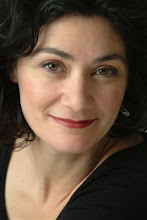This past week has been dominated by Hebrew classes. For those of you who have spoken Hebrew all your life, the language might not seem particularly difficult. This is a major misconception. My fellow Aleph inmates will tell you otherwise. Hebrew is hard.
I was speculating on what precisely is hard. I speak three languages and must admit that although I certainly have had my linguistic frustrations along the way, I think I've been blessed with a good ear for languages. Perhaps the "ear" can give us a hint. When most of us learned to read and write our mother tongue, we already had the benefit of a sizeable spoken vocabulary. So once we began arranging random letters into words, sounding them out as we went along, we already had an idea of what sounds we should hear. We draw on these experiences when we learn foreign languages too. We know how to sound out words, and even if there are specific pronunciation rules to the new language, they are quickly learned. The learning technique is the same, although the specific rules differ. For example, badminton and tennis require similar skills and the set up for the game, a ball, a racket, a net and a point system, are the same. Specific rules must be learned but the point of departure is quite similar.
Not so with Hebrew. First of all, most of us Aleph students don't have any spoken vocabulary to base our learning on, so we don't recognize the sounds we put together as words. They might be real words - and they might not be. You ask, can't you just sound it out? Well, that's another little Hebrew challenge. Vowels as such are not part of the written words. Those of you who have made a stab at learning Hebrew or speak Hebrew already, know that there are some consonants that can double as vowels, but never exclusively. So if we take the word "dog" for example and apply some Hebrew shinnanigans to it, it could be written like this: "dg". The options for how this word should actually be pronounced, were we to apply Hebrew rules to it, are multiple: dag, dog, dig, dug etc. On top of that the letters that function as vowels and consonants, depending on their mood, can change how many syllables are in the word. So taking the word "girl" as our guinea pig, we could end up with garal, grol, grel etc. Or grevel - the "v" can be an "o" or "u" in addition to being a "v"... Hebrew letters should have taken Oscar Wilde's advice: "be yourself, everybody else is taken".
Besides being maddening this is also very interesting. First of all, it means that children growing up with Hebrew have been solving brain teasers since they were about five years old. Secondly, it opens up an interesting elaboration on what Talal Asad (From "An Idea of an Anthropology of Islam" 1986) refers to as "discursive tradition". Discursive tradition is about what is accepted as correct and right practice in a social group. Asad was specifically writing about Muslim practices, but I think his idea can be expanded to other social groups. In his argumentation, "apt practice" (I think that's how he referred to it) is determined by the person or institution who has been given status and power by the group. This can be in the form of academic degrees, appointment to leadership position or simply by being a respected elder in the community. This could be the local Imam, for others it could be their teacher or parent that instructed them. So, where for example the orthodox beit din (Jewish religious court) says this or that is correct Jewish practice, a reform beit din may decide differently. But if they didn't have a group behind them to say "You are our expert", their opinions and rulings would be insignificant.
So, what does all this have to do with Hebrew? I wonder who decided what vowels were to be accepted as the "right" ones in biblical writings in Hebrew. In class, we ask our teachers daily questions like, how do we know this word is "salt" and not "king": m-l-ch? It has the same spelling. They tell us it depends on the context. Well, context can be a very personal thing. So, my point is that interpretation of biblical texts must have happened on a very basic level. They were not just discussing what the scribes of the Torah meant by this or that, but scholars must have also have wondered, "what words are written here?" The slightest change in vowel can lead to a dramatically different word and thereby meaning. I don't know how much educated guess work the scholars did. Maybe there weren't so many uncertainties. In theory though,the demand for many view points - all of them potentially right - are incorporated into these writings
With that I will return to my studying and will try and keep this philosophical frame of mind, rather than....well, in the name of free interpretation, I'll let you fill in the blank.
Shabbat shalom.


1 comment:
Hej!
Din side dur! Eller skulle jeg hellere sige:
Dn sd dr! Som jo så kunne betyde: Den sad, dear!
J.
Post a Comment